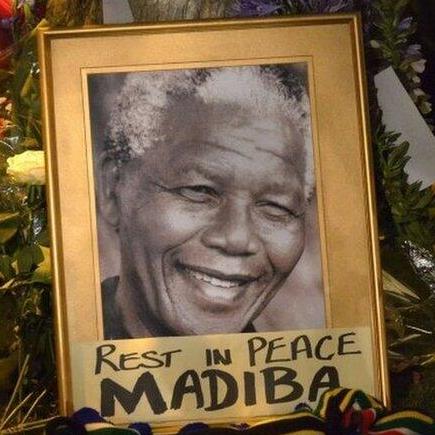I will never forget my friend Madiba. pic.twitter.com/UX21ZZG7cg
— Bill Clinton (@billclinton) December 5, 2013
No one is born hating another person because of the color of his skin, or his background, or his religion. People must learn to hate, and if they can learn to hate, they can be taught to love, for love comes more naturally to the human heart than its opposite.
- Nelson Mandela, Long Walk to Freedom
 The passing of Nelson Mandela leaves the world a much poorer place. There aren’t a lot of respected and well-known voices advocating for non-violence these days, and Mandela brought a sense of credibility and gravitas to the discussion that will be tough to replace. It was impressive enough that he survived 27 years on Robben Island with no rancor. He watched his daughters grow up through the glass of a prison waiting room, and he lost almost a third of his life to South Africa’s brutal apartheid regime. At the end of it all, he somehow emerged with a smile on his face and peace in his heart, a victor over his circumstances in a way few could duplicate.
The passing of Nelson Mandela leaves the world a much poorer place. There aren’t a lot of respected and well-known voices advocating for non-violence these days, and Mandela brought a sense of credibility and gravitas to the discussion that will be tough to replace. It was impressive enough that he survived 27 years on Robben Island with no rancor. He watched his daughters grow up through the glass of a prison waiting room, and he lost almost a third of his life to South Africa’s brutal apartheid regime. At the end of it all, he somehow emerged with a smile on his face and peace in his heart, a victor over his circumstances in a way few could duplicate.
Mandela set to work trying to heal the wounds of the past, and circumstances helped him succeed in a way that would have been impossible prior to his efforts. He embraced the South African national rugby team prior to the 1995 Rugby World Cup in South Africa, in itself an act of courage and surpassing grace. The Springboks at that time were associated with the worst of South Africa’s White power structure. Most Blacks hated the Springboks, and who could blame them? Given the vicious, lethal nature of the apartheid system, Blacks had good reason to despise a team they associated with their oppressors. Then came the day when Mandela stood in front of several thousand Black South Africans wearing a Springboks cap. He asked those present to support the national team, because they represented all of South Africa. And represent they certainly did.
The Springboks won the Rugby World Cup, a turning point in Mandela’s effort to unite South Africans. After the game ended, Springboks captain Francois Pienaar was asked what it felt like to win the World Cup in front of 60,000 South Africans. He responded by saying that there weren’t 60,000 South Africans present, there were 43 million. At that moment, what had represented the worst of White oppression became the symbol of an entire nation. Without Nelson Mandela, there can be little doubt that moment would never have come to pass. On June 24, 1995, South Africa became a united nation. There were still problems, of course, but Mandela and the Springboks had succeeded in making the Rugby World Cup about ALL South Africans. The country could easily have descended into a vicious, protracted race war. Instead, Black South Africans by and large decided to look forward and embrace the future instead of exacting retribution for the past.
There’s much more about Mandela’s legacy, but there are plenty of writers, pundits, and politicians who can and will express their feelings far more effectively than what what few feeble words I have to offer. Mere words can’t begin to do justice to a man who endured in a way most of us never could. That he led South Africa without rancor or a desire for retribution is something I can only marvel at. There are few man for whom and endless array of superlatives are not nearly enough; Nelson Mandela demonstrated that one person with a clear heart and change the world.
And he did.
